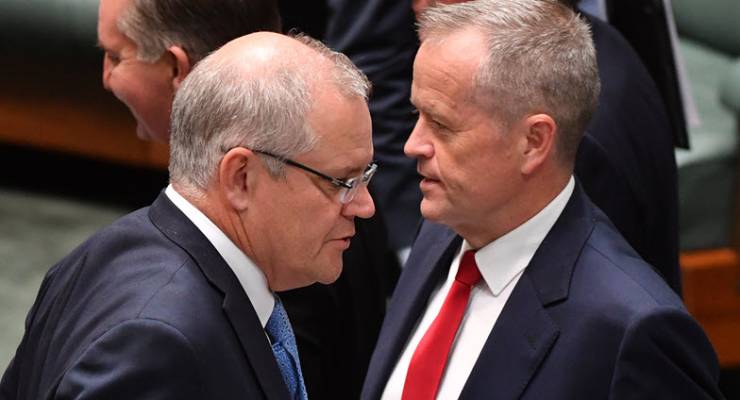
Recently released Australian Electoral Commission data shows that donations from the energy sector surged in 2017-18. As the government attempted to resolve its internal climate crisis and address concerns about price-gouging, companies sought to directly influence policymakers.
Energy sector donations to the major parties increased 45% on 2016-17 and nearly 50% compared to 2015-16, despite the lack of a major election. Indeed, last year was the biggest year for energy sector donations since 2013, when US company Peabody Energy (which later sought bankruptcy protection), Caltex, Chevron and now-shuttered Linc Energy threw hundreds of thousands of dollars at the Coalition.
This time, however, the donations were almost evenly split; $450,000 flowed to the Coalition across all state branches, and $428,000 went to Labor. That’s a similar split to 2016-17 and 2015-16, when the Coalition secured a bit more than 50%. Alinta Energy was a new donor. It handed over $50,000 and nearly $68,000 to the Coalition and Labor respectively (primarily the WA branches of the parties, reflecting its home base in Perth). Mid-cap oil and gas producer Senex was also a new entrant, handing $20,000 to SA Labor and just over $15,000 to the LNP — the two states where it operates.
However, the traditional energy sector donors also stepped up their efforts during the year. Caltex more than doubled its donations to around $97,000, slightly favouring the Coalition. Chevron, traditionally a big donor to both sides in the earlier part of this decade, bumped up its donations to over $100,000. Santos, which was right at the heart of the energy debate with its LNG exports, had its biggest donations year since 2013, nearly doubling donations to over $180,000 to federal and state Labor and Liberal branches and the Nationals. Origin, always a big donor, spent more than $100,000, taking out $25,000 in fundraising subscriptions with both federal parties and giving smaller donations, favouring the Coalition slightly, to state branches.
Only Woodside, which had only a marginal role in policy debates, had a quiet year, giving $110,000 to both sides’ federal branches and some loose change to other branches. If there’s a company more locked into Australia’s governing class than Woodside — which hands hundreds of thousands of dollars to both sides of politics and in return has a bipartisan foreign policy run for its commercial benefit — we don’t know who it is.
The surge in energy company donations more than offset the fall in mining donations. The miners had their quietest year since 2014-15 (they’d given the Coalition more than three-quarters of a million dollars for the 2013 election, so closed their wallets the following year), and handed just $450,000 to the Coalition. As always, mining donations to Labor are less than a tenth of those to their opponents; the only donor in 2017-18 was the Minerals Council, which gave around $41,000 to Labor fundraisers.








The so-called donations from energy companies should be called out for what they are.
Involuntary donations by industry and mug consumers who are being gouged to maintain political support for sakes policies that are so often against their interests as consumers and taxpayers
Any corporate “donation”is simply corruption masquerading under another name.
The payoff ratio must be huge and makes the donors look pretty stingy. 100k donation for possibly 50 or 100 million benefit. The gas exporters have a total royalties rort complements of our supine duopoly. As I suggested yesterday if Shortarse wants some real traction on the franking / CGT and negative gearing, he should propose also totally scrapping the PRRT including all the uplift bullshit and just have a straight old fashioned no deductions royalties scheme – with a promise that will finance lower income taxes for all low and middle income earners.
Then there’s the electricity sector. Abolish the AEMC forthwith. Rewrite the transmission and distribution return rate rules. Introduce 5 minute rule for generators tomorrow. Slash the capped maximum wholesale price. And bring back a big fat carbon tax. As if.
Why spoil a perfectly good comment with a gratuitous insult.
If you don’t like corporate ‘donations’ to political parties, give your vote to a party that does not accept such.
Has any journo. ever put the simple question “Why do ..insert donor … give money if not for favourable legislation?” to either T1 or T2?
No point asking …insert name… why they make donations – they’d only lie.